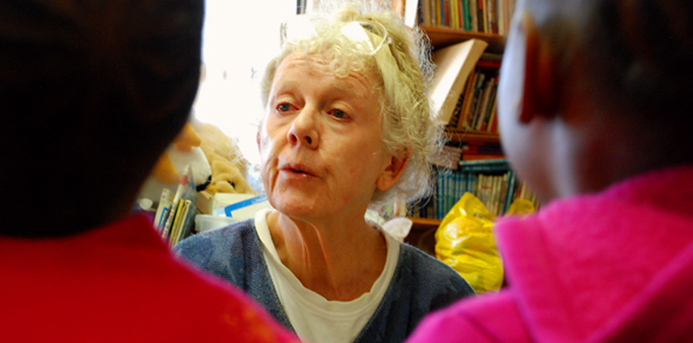In a few weeks, we will celebrate Mother’s Day – an opportunity to remember our own mothers and to reflect on how we mother those we love, whether they are our children or not. Mothering can be seen as the daily expression of one’s values and passions. Sue Duncan, an important figure in the history of education in Chicago, is an inspiring example of how these values and passions are communicated to one’s own children, others we care for, and how that legacy can live on from one generation to the next.
In 1961, Duncan lived in Hyde Park on the south side of Chicago. She had recently retired from teaching and began to volunteer with a Bible study group of 9-year-old girls. She quickly learned that these girls could not read. She decided to create an after-school program for children and young adults to provide free tutoring, academic support and recreational and art programs. That year, she founded the Sue Duncan Children’s Center in Chicago’s Oakland neighborhood.
Three times a week for 50 years thereafter – without compensation and using her own personal funds – Duncan packed up her blue station wagon, loaded her own three children as they came along, and headed down to the center. At the time, a white woman with three small children was an oddity in the African American neighborhood. Some residents were threatened and hostile, but she persisted. Duncan’s son Arne Duncan, in his confirmation hearing to become Secretary of Education, recalls some of the dangers they faced:
“I was about 6 years old, in 1970, the church that we were working out of was firebombed by the Blackstone Rangers. . .Our lives were threatened. My mother’s life was threatened. I remember leaving work one night and a guy coming by and saying if we came back the next day we’d be killed. And so we had an interesting conversation that — that night at home at dinner. . .And we tried to figure out what to do and really decided that you can’t — you can’t run. And once you start running, you know, you’ll be chasing your shadow eventually. So we showed up the next day and luckily he didn’t.”
The center became “home” for many. Duncan acted as a non-biological mother, offering stability, rules and codes of conduct. She was a mild but firm disciplinarian. Despite the rules and expectations, she was gentle and supportive. In a documentary about her life called “Remember Me Sue” one young person remembered Duncan comforting her after a disappointment, crying with the young girl and assuring her it would be okay.
Duncan expected the same things from kids in the center as she did of her own children. Duncan’s daughter Sarah Duncan recalls her mother saying: “These children are as smart as you are, they just have not had the opportunities that you have been given.”
Duncan set expectations and gave young people ambition. In “Remember Me Sue,” Duncan asked, “Do you want an ‘A’ life or a ‘B’ life?” One of her “children” recollected that, “Sue saw in me more than I saw in myself.”
Although Duncan has now retired, the center is still going strong under the leadership of her son Owen Duncan, who serves as executive director. A second site was opened in Woodlawn in 2013, and a third will open in Englewood in 2015. Participation in the Sue Duncan Children’s Center pays off in many ways, but particularly in academic performance. Those who spend one year usually earn a B average; after three years, they are on the Honor Roll; of those who persist through high school, 100 percent graduate from high school and 100 percent go to college.
Duncan’s community impact and example have been recognized and lauded. Most recently, she was presented with the UNICEF Chicago Humanitarian Award. Her impact on her own family has also been profound. In addition to Owen’s ongoing role in the center, Duncan’s other children have embraced their mother’s passion for education and service as well. Her oldest son, Arne, is the United States Secretary of Education. Her daughter, Sarah, is co-director of the Network for College Success at the University of Chicago.
In a recent interview, Sarah noted that, “Mom’s philosophy was, ‘You are on this earth to make the world a better place.’ She was not building philanthropists; she was building ‘doers.’ The ‘doing of it’ instilled the values…We were hardwired for service.”
Sarah summed it up beautifully: “In 1961, our mother was really ahead of her time. She was a very gifted teacher. She wanted to be near kids every day. She had vision and high expectations…She built confidence you could do anything, you could be excellent and she would help you get there. She was, and is today, very powerful.”

